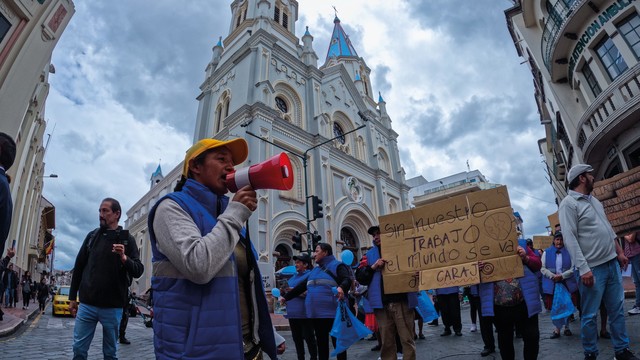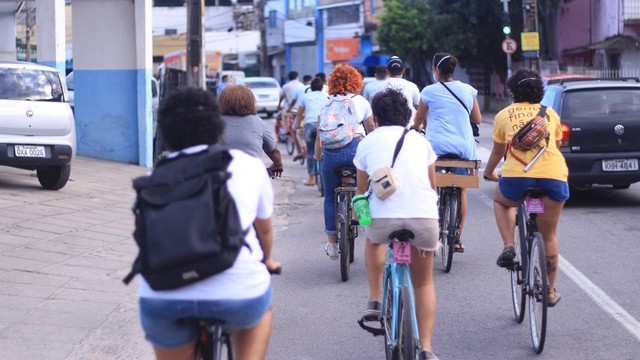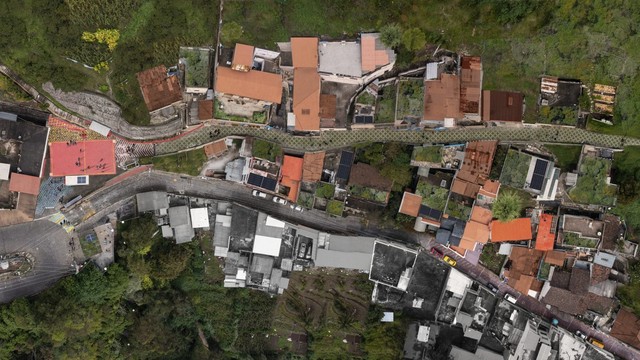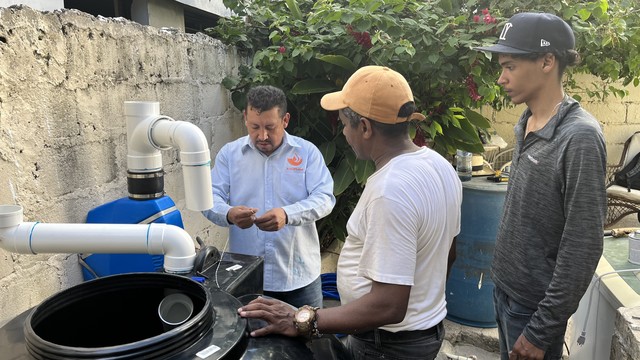Teresina: promoting social wellbeing, healthy diets and climate resilience in the Dirceu Community Garden
Supported by local policies and training initiatives such as HortEduc, the Dirceu Community Garden in Teresina tackles food insecurity and promotes sustainability.

Aerial view of Dirceu Community Garden (Photo: IFPI, Dirceu Campus)
Teresina, the capital of the state of Piauí (PI), had an estimated population of 871,126 in 2021. Together with the neighbouring city of Timon in Maranhão (MA), it forms the second most populous integrated development region in Brazil – Greater Teresina, which is home to approximately 1,223,220 residents.
Teresina ranks among the world’s hottest cities. Over the past four decades, the city has experienced an average temperature increase of 1ºC (in Portuguese). This continuous rise in temperature is expected to trigger a significant wave of rural-urban migration from the surrounding areas.
The convergence of ongoing climate trends, compounded by poverty and inequality and rapid urbanisation, has resulted in rural deforestation and the loss of urban vegetation. From 2001 to 2019, the urban perimeter of Teresina saw a 40% reduction in its tree cover, which has contributed to the ‘heat island effect’ in the region.
Teresina’s food insecurity (PDF) is a growing problem, particularly among the city’s most vulnerable populations. To address these challenges Teresina has prioritised tackling ecosystem imbalance, a key focus in its commitment to UN-Habitat’s City Resilience Global Programme. This initiative highlights the urgent need for green infrastructure and nature-based solutions to strengthen the city’s resilience.
A key strategy in Teresina to slow down the rising temperatures involves improving the city’s green cover (PDF). This is being achieved by planting trees, developing new parks and promoting family farming (in Portuguese) within the urban landscape.
As well as helping to preserve biodiversity, urban gardens also play an important role in improving food security, increasing income and improving the quality of life for residents. Agriculture in urban and peri-urban areas, a practice deeply rooted in Brazilian tradition, is carried out by a diverse range of entities, including both organisations and individuals, regardless of socioeconomic backgrounds. The goal is to merge a developmental approach with the principles of social justice and sustainability.
Josefa Soares da Rocha, president of the Horticulturists' AssociationI am deeply appreciative for all the lessons I’ve learned from the project workshops. It was a period of significant learning, which I believe will enhance the diversity of products we can offer our customers. This, in turn, has the potential to substantially boost our revenue
Urban agriculture for resilience
Teresina is currently facing high rates of deforestation and a continuous depletion of its urban green spaces. The focus is now on improving the city’s green infrastructure to lower temperatures and mitigate the urban heat island effect.
In addition to Brazil’s vulnerability to climate change, in 2022, 33.1 million (in Portuguese)Brazilians were facing hunger, and only four in ten families had adequate access to food. In 2021, 29.3% of Teresina’s population was living below the poverty line. This number is largely made up of Black and Indigenous communities living in geographically vulnerable neighbourhoods, often located on flood plains (PDF). The state of Piauí has a high level of food insecurity, with 66.1% of families experiencing severe food-related hardship (in Portuguese).
Numerous studies have identified urban family and community farming as a viable solution to ensure food availability, promote livelihoods and human dignity, combat unemployment, and address the problems of exclusion, climate change and the segregation induced by capitalism.
The integration of community and family urban gardens in Latin American cities has been increasingly recognised as a vital component of enhanced urban management (PDF in French), leading many municipalities to acknowledge the need to formulate supportive policies for their development.
The Brazil Without Hunger Plan (in Portuguese), relaunched for 2023, aims to eradicate hunger in Brazil. This policy has three key pillars: facilitating access to income and social protection; encouraging food production and consumption; and fostering collaboration among various entities in the fight against hunger.
At a national level, initiatives such as PAN-Brasil (in Portuguese) and PAE Piauí 2015 are the two principal state policies targeting hunger eradication. These policies are designed with a focus on poverty reduction, educational improvement, food security and overall improvement in the quality of life.
More recently, at the local scale, CESU/Teresina (in Portuguese), a pilot project for reducing carbon emissions through climate technologies in urban settings, has also solidified institutional support for urban gardens, recognising their crucial role in bolstering the local economy, promoting food autonomy and strengthening resilience against climate-induced disasters.
In this context, Dirceu’s Community Gardens in Teresina serve as a noteworthy case study. After 36 years in operation this garden continues to make significant contributions to the city’s social, economic and environmental sustainability.

Aerial view of the Dirceu Community Garden (Photo: IFPI, Dirceu Campus)
Dirceu Community Garden
Established in 1987, the Dirceu Community Garden, located in the southeast of Teresina, started off as an innovative means of providing additional income for the local community and addressing the marginalisation of children and adolescents.
The project, which was spearheaded by Teresina’s Municipal Department of Agriculture and Supply (SEMAB), allocated plots of land under the high-voltage power lines managed by the São Francisco Hydroelectric Company (CHESF), which had access to water.
This initiative evolved into a production and sales programme catering to local markets. Spanning an area of 27 hectares (200,000 m2), it provides livelihoods for 418 families. It is also considered to be the largest urban vegetable garden in Latin America (in Portuguese).
It has numerous benefits. It has significantly improved the community’s dietary habits and has been a vital source of income, especially during and in the aftermath of the COVID-19 pandemic. Interestingly, the garden has increasingly attracted women’s participation, particularly those with lower levels of education. This can be attributed to the rising unemployment rates in the city, which affects this specific demographic.
Social inclusion through community cohesion
As noted above, Teresina is likely to experience a surge in rural-to-urban migration due to increasing temperatures. The city, which is already struggling to provide basic services to its growing population, is facing an acute challenge in ensuring food security. Studies show that strengthening agroecology (PDF) can enable more equitable and climate-resilient food systems.
Through the community gardens, marginalised communities have worked together to produce healthier food for their own families and for the region, engaging with wider society by providing a vital service. The initiative has also included the development of inclusive policies and the protection and maintenance of the four-kilometre long green corridor that forms Dirceu’s Community Garden. Once a barren wasteland, this area now contributes to the city’s commitment to future resilience.
From a political and social perspective, the emphasis is on recovering local culture and values. The global discourse around climate injustice and the exploration of innovative solutions in family farming to reduce social inequalities and address associated rights violations are gaining traction in Brazil and elsewhere.
This highlights the pivotal role urban gardens play in tackling climate change and strengthening the resilience of vulnerable populations. They have become strategically important for ensuring social wellbeing and healthy diets for of the community at large.
Project activities in the Renascença urban garden (Photo: IFPI, Dirceu Campus)
Environmental impact of community gardens
The practice of caring for the land through urban gardens also galvanises broader community engagement in initiatives aimed at combating climate change and enhancing biodiversity conservation. The transformation of an underutilised space beneath high-voltage power lines into a thriving, income-generating area by the 418 families involved has significantly reduced Teresina’s carbon footprint.
- The proximity of food production reduces the need for fuel in the distribution process, packaging and refrigeration
- The garden’s 27 hectares of land enable carbon to be stored in the soil. A study in Seoul in 2015 estimated that an area of 51.15 km2 could lower CO2 emissions by 11.67 million kg annually, which means the Dirceu gardens’ contribution to CO2 emissions reduction could be 45 million kg per year
- Organic waste is recycled back into the soil as compost, avoiding the need for landfill disposal
- Protecting these green spaces plays a vital role in reducing the urban heat island effect, and
- Urban gardens can improve rainwater drainage. Studies show that urban agriculture can enable absorption of 20% of rainfall and increase storage capacity by 65%, contributing to better water management in urban areas.
The climate debate unfolds against the backdrop of environmental change driven by industrial economic activities and greenhouse gas emissions, which have accelerated global warming. In this context, the conversation around collective rights emerges amid critiques of the capitalist system. These critiques centre on the system’s tendency to challenge principles of collectivism, solidarity, fraternity and a collective sense of humanity, and the need to promote activities focused on caring for the earth.
Climate justice is perceived as a means to bridge inequalities. It addresses socio-environmental vulnerabilities exacerbated by climate change, aligning closely with the concept of safeguarding rights enshrined in Brazil's constitution (PDF). This approach is actively being pursued in the municipality of Teresina, PI.
Socioeconomic benefits of the Dirceu Community Garden
More than 400 farmers (in Portuguese) are producing more than 12 varieties of organically grown medicinal vegetables, which are sold in both local and regional markets. While these gardens may not be able to satisfy the broader economic demands of the city, they have considerable potential to reduce unemployment and provide a vital source of income for people in precarious financial situations.
However, the community is facing many challenges. Security at the site is a persistent problem and although there are fences, the absence of adequate lighting has led to frequent robberies at night. The increasingly heavy rainfall coupled with inadequate drainage systems often results in flooding of vegetable beds, leading to crop loss. Moreover, the community acknowledges a gap in their knowledge of crop diversification, horticultural techniques, and the business and marketing know-how necessary to successfully promote their products.
Therefore, institutional support is essential to support communities in addressing these challenges and strengthening the community’s capacity for sustained growth and resilience.

Training for women farmers in the IFPI kitchen laboratory (Photo: IFPI, Dirceu Campus)
HortEduc: strengthening capacity to improve efficiency
Acknowledging the important role of urban agriculture in shaping the future of the city, the Federal Institute of Piauí (IFPI) (in Portuguese) launched the HortEduc (in Portuguese) extension project in 2022, promoting “solidarity entrepreneurship.” This initiative established a partnership with the Associação dos Horticultores do Dirceu (Dirceu Horticulturists’ Aasociation).
The main aim was to address the specific challenges faced by women farmers through the initial training of 22 farmers. A grant of BRL 100,000 (approximately US$20,000) was allocated to purchase equipment and facilitate training programmes, which were led by four dedicated instructors. Together, they identified four critical areas for the continuous development and empowerment of farmers in community gardens:
- Capacity building of farmers to enable them to become income generators and entrepreneurs
- Techniques for improving organisation, management and efficient land use. This includes crop diversification, understanding crop selection compatibility and strategies to minimise the agricultural carbon footprint
- Developing new skills and expanding the customer base by introducing a new and healthy product – the 'salada de pote', a ‘pot salad’ made with their own organic produce, and
- Improving knowledge around maintaining food security and mitigating socio-environmental vulnerabilities.
The institute played a pivotal role in supporting these newly certified farmers. It leveraged its media channels to highlight their achievements and promoted the innovative initiative at a farmers' market, showcasing samples of the 'salada de pote' to the academic community and local residents.

Training in soil management (Photo: IFPI, Dirceu campus)
Looking ahead
The strategies outlined above emphasise the critical role of family farming within community gardens in fostering local entrepreneurship and generating income in Teresina-PI.
These practices are also effective tools in tackling climate change. The project has been recognised by the local community and the Federal Institute of Piauí, both of which have a shared commitment to further local development and strengthen family farming. This, in turn, contributes to enhancing the city's overall resilience. Key actions include:
- Ensuring the preservation of urban agriculture in the green spaces of Dirceu, safeguarding its economic and ecological functions for the long term
- Promoting accessible technological innovations that provide practical alternatives to more conventional, often exclusive, technologies
- Advocating for the municipal administration to improve the infrastructure essential for the optimal functioning of the Dirceu Gardens
- Providing ongoing training to vegetable producers to refine management techniques and land use, thereby encouraging more sustainable agricultural practices, and
- Prioritising environmental initiatives and acknowledging the crucial role of family farming community associations in advancing sustainability and addressing issues of poverty, inequality and climate change.
Further reading
- O sistema de espaços livres públicos urbanos: análise descritiva de um território de baixa renda com ênfase em praças e parques na zona Sudeste de Teresina, Piauí (in Portuguese), Revista Contribuciones a las Ciencias Sociales (2023)
- Video: Vida, Lida e Luta (2022)
- Climate justice: hope, resilience and the fight for a sustainable future, Bloomsbury book (2021)
- Greenhouse gas emission reduction effect in the transportation sector by urban agriculture in Seoul, Korea, Landscape and Urban Planning (2015)
- Agricultura urbana em Teresina: o rural que permanece na cidade (PDF in Portuguese), Universidade Federal de Pernambuco (2014)
- Growing greener cities in Latin America and the Caribbean (PDF), FAO report (2014)
Author

Ana Keuly Luz Bezerra (analuz@ifpi.edu.br) is a lecturer at the Federal Institute of Piauí (IFPI), Dirceu Campus
Frontrunner cities forms part of the Transformative Urban Coalitions (TUC) project, funded by Germany's Federal Ministry of Economic Affairs and Climate Action



